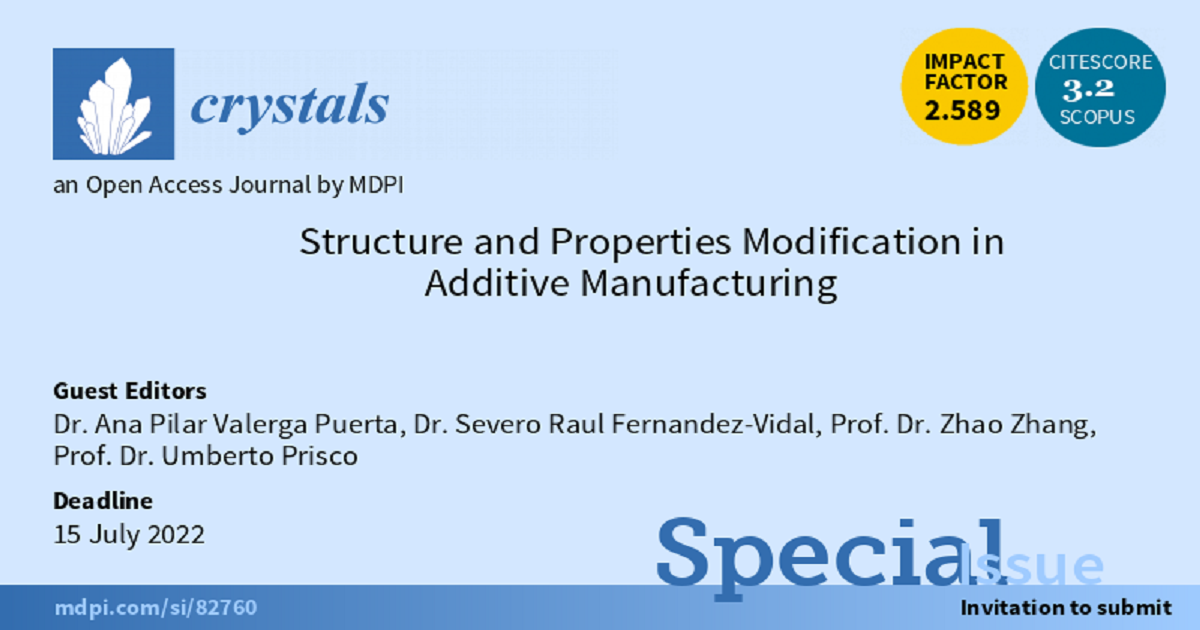- 2.4Impact Factor
- 5.0CiteScore
- 13 daysTime to First Decision
Structure and Properties Modification in Additive Manufacturing
This special issue belongs to the section “Hybrid and Composite Crystalline Materials“.
Special Issue Information
Additive manufacturing is an interesting and widespread topic, which has a remarkable range of processes, with different materials and properties. Advances in this field have grown and paved the way for the inclusion of these processes in the industry.
However, on many occasions, properties are not scientifically compared to the changes obtained in the material according to the parameters or post-processing applied to the parts. This can be studied in both metals and plastics and is attracting the interest of many researchers.
We invite researchers to contribute to the Special Issue, which is intended to serve as a unique multidisciplinary forum covering broad aspects of the science, technology and application of materials used in additive manufacturing.
Possible topics include, but are not limited to, the following:
- Real structure and properties of metal additive manufacturing
- Real structure and properties of polymeric additive manufacturing
- Surface modification
- Characterisation by spectroscopy and microscopy
- Measurements and characterizations via other advanced techniques
- Device manufacturing
- Material and device modelling
- Engineering applications
Dr. Ana Pilar Valerga Puerta
Dr. Severo Raul Fernandez-Vidal
Prof. Dr. Zhao Zhang
Prof. Dr. Umberto Prisco
Guest Editors
Manuscript Submission Information
Manuscripts should be submitted online at www.mdpi.com by registering and logging in to this website. Once you are registered, click here to go to the submission form. Manuscripts can be submitted until the deadline. All submissions that pass pre-check are peer-reviewed. Accepted papers will be published continuously in the journal (as soon as accepted) and will be listed together on the special issue website. Research articles, review articles as well as short communications are invited. For planned papers, a title and short abstract (about 250 words) can be sent to the Editorial Office for assessment.
Submitted manuscripts should not have been published previously, nor be under consideration for publication elsewhere (except conference proceedings papers). All manuscripts are thoroughly refereed through a single-blind peer-review process. A guide for authors and other relevant information for submission of manuscripts is available on the Instructions for Authors page. Crystals is an international peer-reviewed open access monthly journal published by MDPI.
Please visit the Instructions for Authors page before submitting a manuscript. The Article Processing Charge (APC) for publication in this open access journal is 2100 CHF (Swiss Francs). Submitted papers should be well formatted and use good English. Authors may use MDPI's English editing service prior to publication or during author revisions.
Keywords
- Additive manufacturing
- Mechanical properties
- XRD
- Materials
- Engineering
- Surface modification

Benefits of Publishing in a Special Issue
- Ease of navigation: Grouping papers by topic helps scholars navigate broad scope journals more efficiently.
- Greater discoverability: Special Issues support the reach and impact of scientific research. Articles in Special Issues are more discoverable and cited more frequently.
- Expansion of research network: Special Issues facilitate connections among authors, fostering scientific collaborations.
- External promotion: Articles in Special Issues are often promoted through the journal's social media, increasing their visibility.
- e-Book format: Special Issues with more than 10 articles can be published as dedicated e-books, ensuring wide and rapid dissemination.

